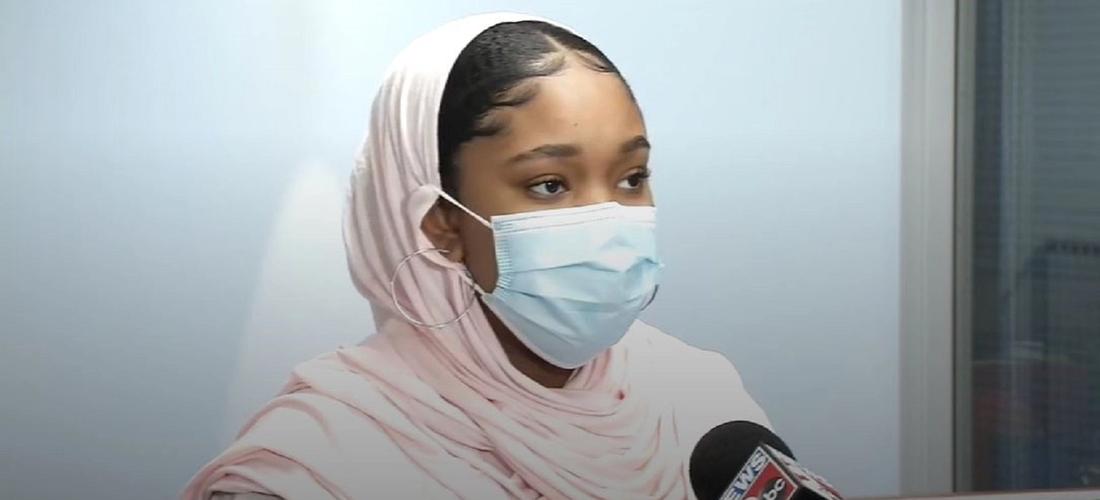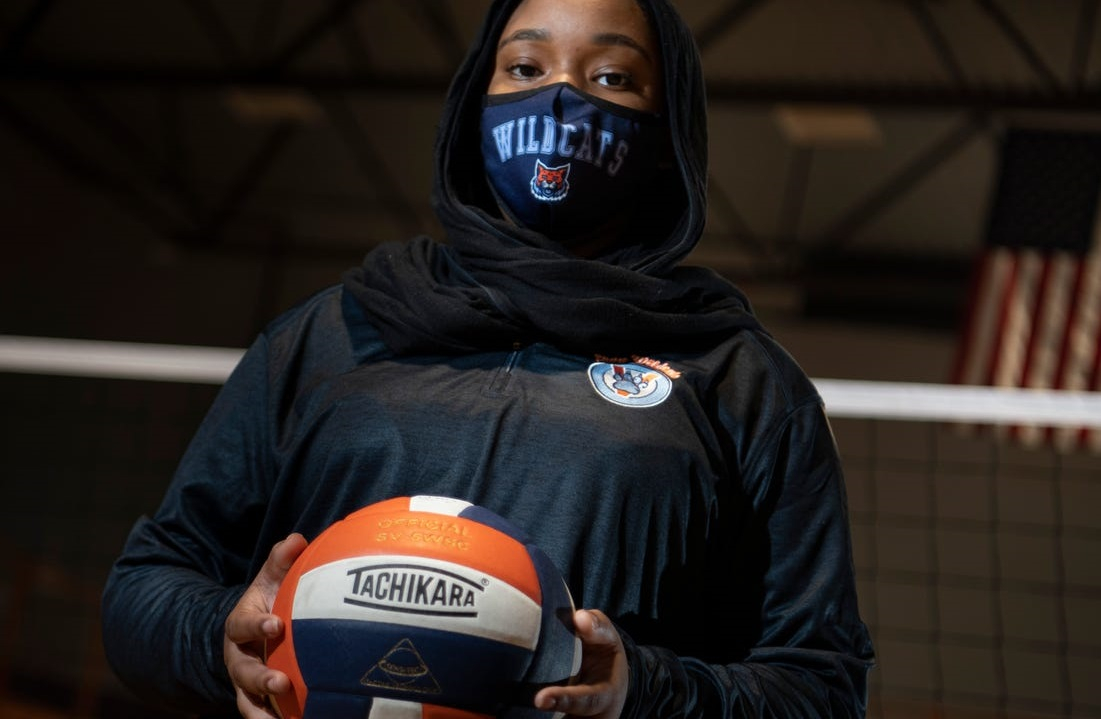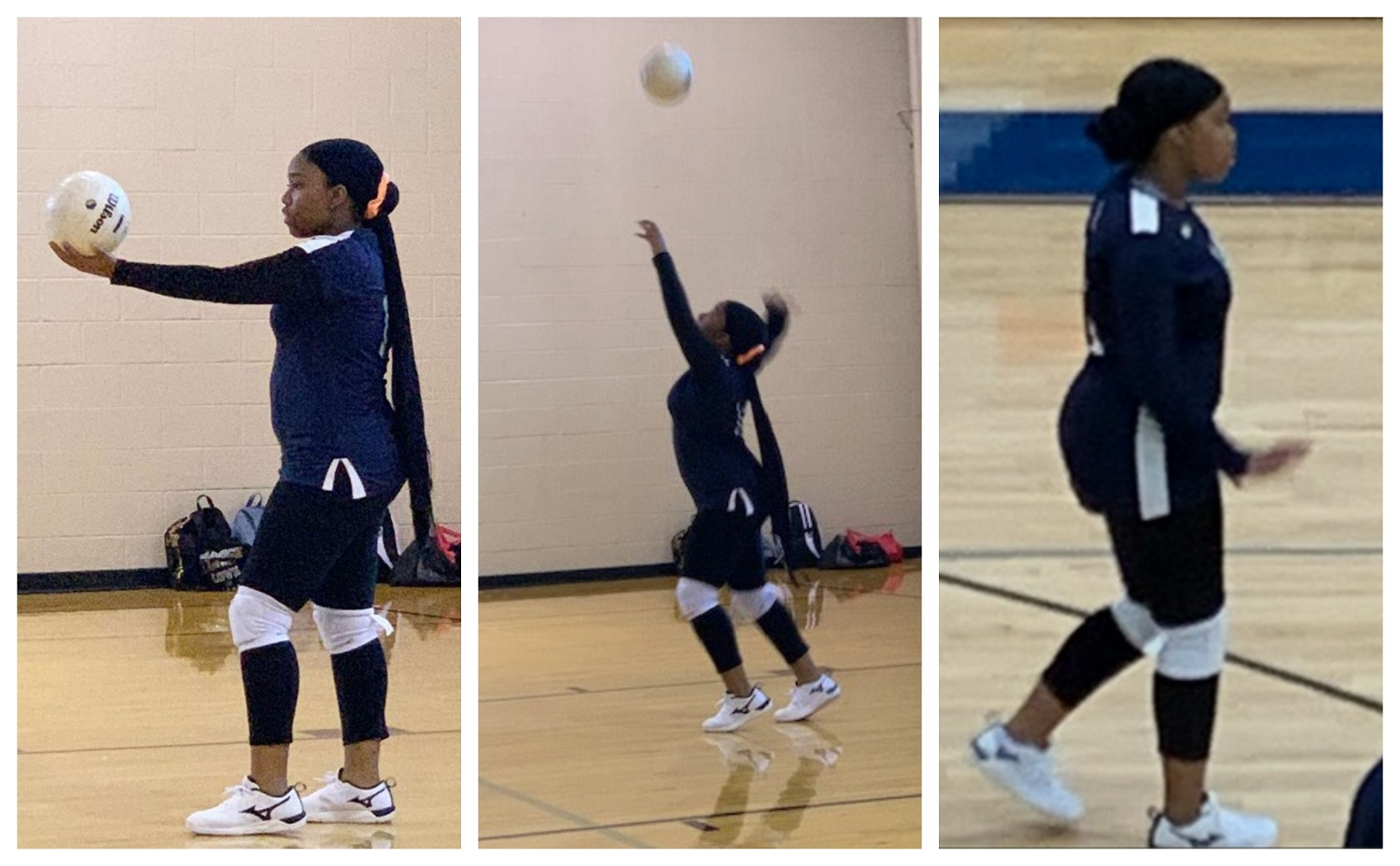Can't Ban Us – National Rule Change on Hijab Sparked by High School Volleyball Player
Current Events
|
Feb 5, 2021
|
4 MIN READ

Image source: Najah Aqeel's press conference
The call came to me late Wednesday evening, and I was surprised to see whose name flashed on my phone – Aliya Aqeel, mother of Valley College Prep (in Nashville, Tennessee) 14-year-old volleyball player Najah, who had been disqualified from the second volleyball game of the season (against Brentwood Academy) in early fall for not having a signed waiver for her hijab.
“I just wanted to let you know some big news! We’ve managed to get the ruling on religious headwear for high school volleyball players changed on a national level,” Alia told me. “You’ve been with us from the beginning on this, so I wanted to let you know first!”
Not only has Najah and her family’s hard work and perseverance paid off in sparking a rule amendment at a state level, but now the rule regarding religious headwear for high school volleyball players has changed on a national level as well! Najah and her school successfully petitioned the Tennessee Secondary Schools Athletics Association (TSSAA) to amend their rules regarding religious headwear, including the hijab. They then took their case to a national level, meeting with the National Federation of State High School Associations (NFHS) and asking for a nationwide rules change.
Haute Hijab also met with Lindsey Atkinson, NFHS director of sports and liaison to the Volleyball Rules Committee in late December to present information about hijab, how it is worn, how risk factors regarding hijab have been overblown and the construction of sports hijabs. “The power point was amazing,” Lindsey told us. “I included it in the meeting materials, and I had a pre-meeting with the chair of the rules committee to discuss what I had learned about hijabs, religious headwear and sports hijabs. Entering the meeting, she was completely on board.
“There was literally no discussion on it. We voted unanimously to change the rules, and I think it helped that we gave them the information they needed [about hijab and religious headwear] ahead of time,” Lindsey said. “We felt strongly after learning what we did that religious headwear was not a risk factor.”

Najah Aqeel
At her press conference on Thursday, Najah was thankful and happy to see the results of her and her family’s persistence. “I would like to begin by thanking God,” she said, adding that “hopefully this experience will be one of many stepping stones to stop discrimination. I’d like to send a message out there to all the women that our voices matter, and we need to stand up for our beliefs and values.”
As we wrote in an earlier article about Najah’s fight, Hijab bans are still happening in school and collegiate sports, in businesses and other places across the country. Barely a little over a year ago high school cross country athlete Noor Alexandria Abukaram was disqualified by the Ohio High School Athletic Association as she was running a 5K and beating her personal record. Why? Because her coach had failed to apply for a waiver for her to run with her hijab, which Noor told the New York Times didn’t make any sense because “I don’t have disabilities. I am running just like anybody else.”
Injustice exists in numerous forms all around us, from the most personal of injustices that denies a young Muslim female athlete from engaging her sport simply because of her hijab and/or clothing she wears, to widespread social injustices that plague Muslims (and humans in general) in the United States and around the world. Every time a Muslim female athlete like Najah is out there playing volleyball, or running, playing basketball, kicking a soccer ball, weight lifting, fencing, boxing, ice skating, doing martial arts or whatever the sport is, the message is clear: You can’t ban us.
We are proud to join these fierce women, like Najah and our HH Sport Ambassador and trailblazer Bilqis Abdul-Qaadir, in their fight against hijab bans with our “Can’t Ban Us” campaign that aims to elevate these stories (share your story with us here) and work with athletes and athletic associations and organizations to educate about hijab and how it should never be a deterrent to participating in individual or team sports. Bilqis knows plenty about this injustice. The basketball player and cofounder of Dribble Down Barriers was banned from her dream of playing in the WNBA and internationally because of her hijab nearly a decade ago. “I’m livid,” she told Haute Hijab in an interview. “How can this still be happening? I will not stand for it.”

Najah playing volleyball. Image source: Alia Aqeel
This is a movement that matters to many Muslim women around the world, one that goes beyond our own faith to be a movement of inclusivity of religious-based clothing across the board.
NFHS Executive Director Karissa Niehoff said she hopes that the NFHS position and actions by the Volleyball Rules committee will “provide an encouraging model for other committees, state associations, and schools nationwide; that students of all religious backgrounds feel welcomed and respected as participants in sport and other school activities. Inclusion can lead to incredible learning, personal growth and establishment of lifelong relationships; in addition to creating great sport memories for all kids involved.”
In my interview with NFHS’s Lindsay, she expressed her hope and excitement that this change regarding hijab and religious headwear is something “we are going to see across the board when it comes to interscholastic athletics. I’m really excited. I’m part of the rules committee every year, and typically no one gets excited, and no one cares about rules changes except for the officials who have to officiate games. But this year it’s different. To see something happening that is positive for the community and inclusive. It’s moving in the right direction.”
Subscribe to be the first to know about new product releases, styling ideas and more.
What products are you interested in?

